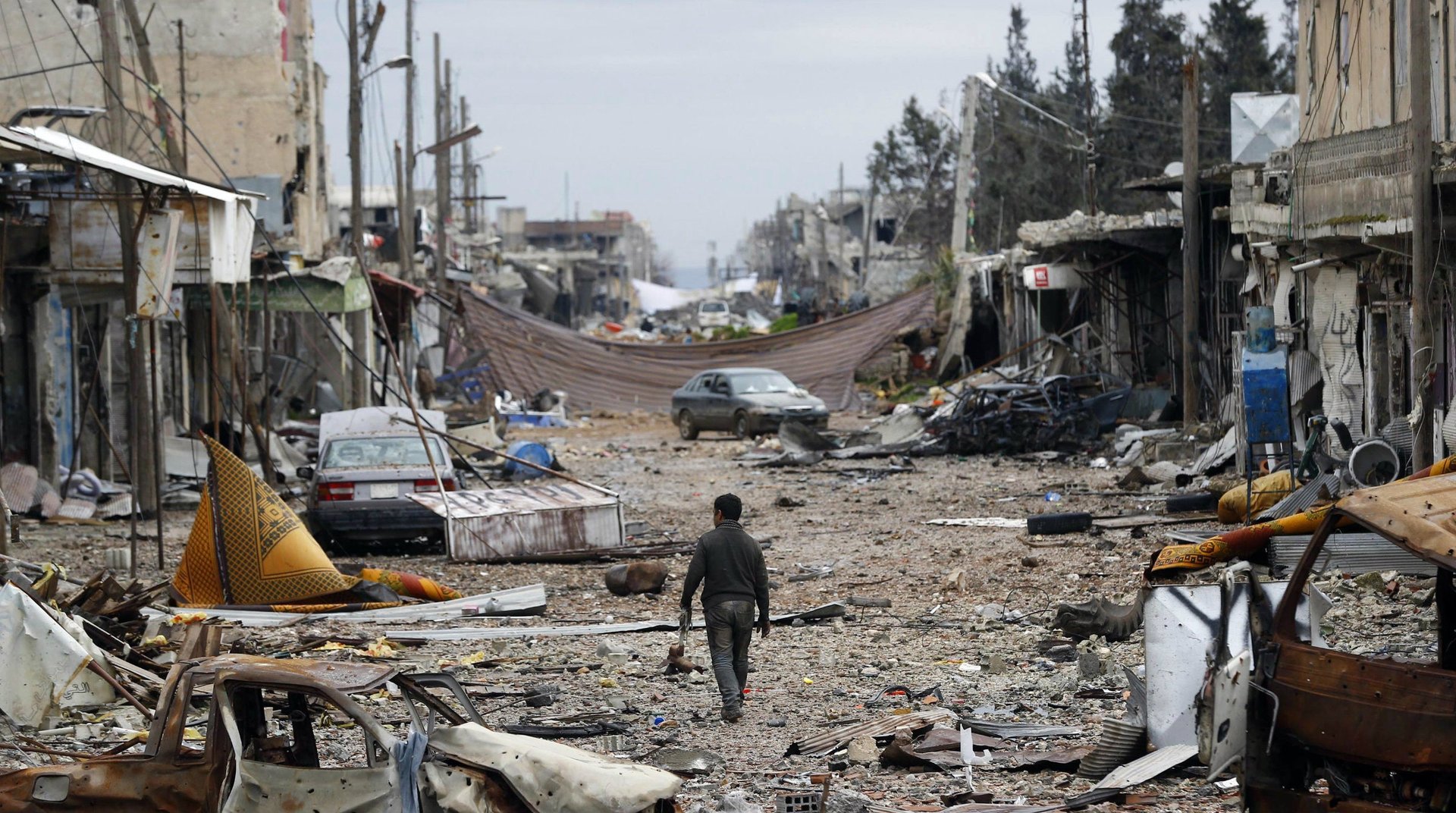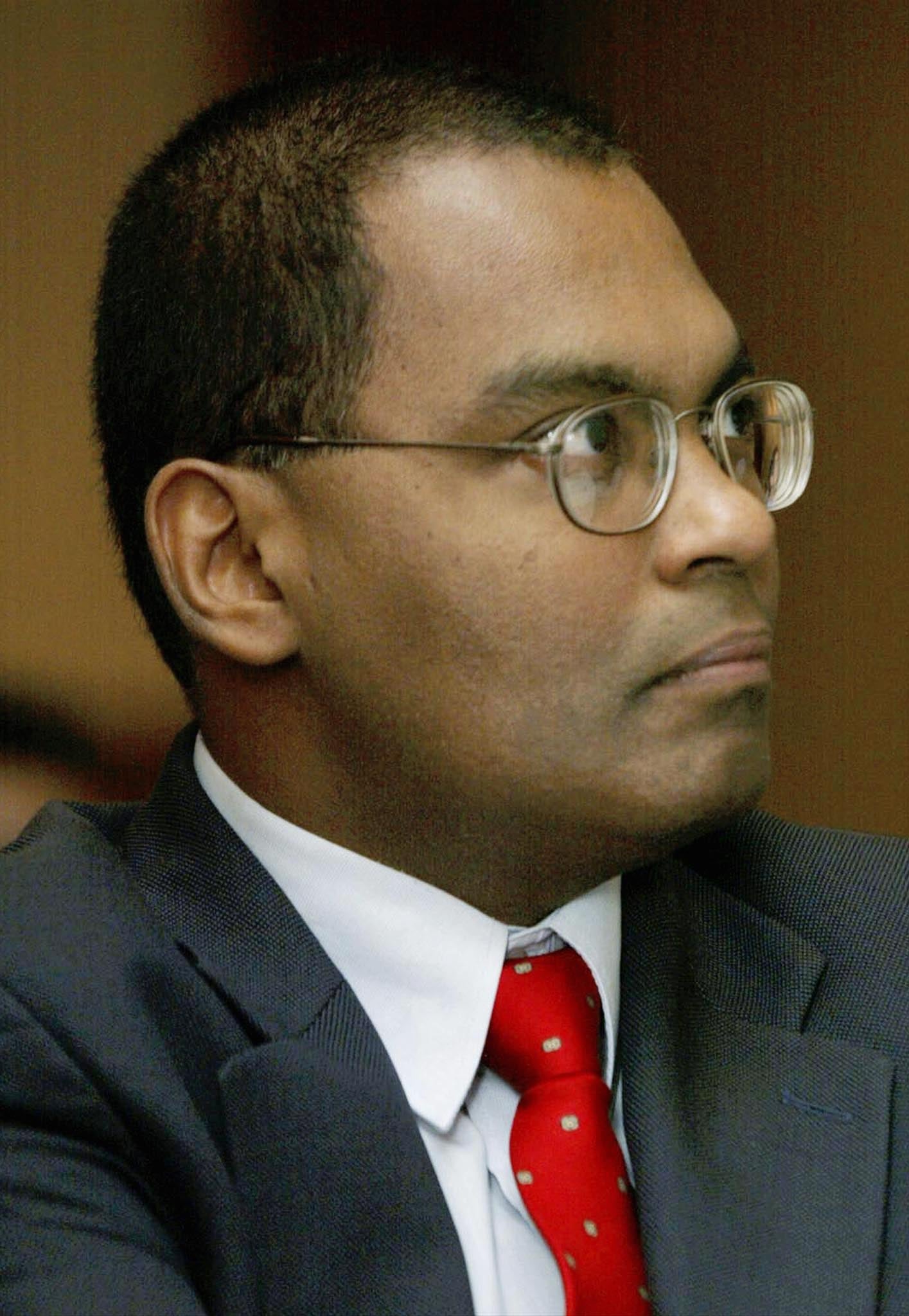Americans have a “moral responsibility” to end the conflict that created the Islamic State
In the aftermath of the attacks on Paris that left more than 120 people dead, there’s been a rush to lay blame on everything from the refugees fleeing the Middle Eastern countries overrun by the Islamic State to the French government’s relations with Belgium.


In the aftermath of the attacks on Paris that left more than 120 people dead, there’s been a rush to lay blame on everything from the refugees fleeing the Middle Eastern countries overrun by the Islamic State to the French government’s relations with Belgium.

At least five of the attackers have been identified as French nationals, indicating that one of the biggest dangers to French citizens is homegrown terrorism, and nationals who identify with ISIL. Still, a host of American state governors and European politicians have said they will refuse to take Syrian refugees.
Quartz spoke to Rohan Gunaratna, the head of the International Centre for Political Violence and Terrorism Research in Singapore, about the root causes of the attacks, the rise of the Islamic State, and how governments around the world should combat terrorism.
Gunaratna is one of Asia’s most prominent terrorism experts, and has been studying the root causes of political violence and extremism since the Sept. 11, 2001 attacks on the United States. He is a former fellow at the Combating Terrorism Centre at the United States Military Academy at West Point, a professor of security studies at the S. Rajaratnam School of International Studies in Nanyang Technological University, Singapore, and has served as a counter-terrorism instructor for government special forces.
QZ: Why does France seem particularly vulnerable to this type of terrorism?
In the past 30 years, we have seen that terrorist groups in the Middle East and Africa have been able to infiltrate the migrant and diaspora communities in France. There is a jihadist subculture, a terrorist subculture that has been slowly and steadily growing among migrants and people living in ghettos, in enclaves. Unless France can reach out and promote moderation and coexistence, and make these French citizens French by building links with them, the threat will persist.
QZ: Is there a historical precedent to this approach that has worked well?
[Authorities should] infiltrate those communities that are vulnerable and monitor them. France should ensure that future migration to France does not make existing settlements more robust, and have a strategy to integrate those who are arriving rather than segregate them.
Look at the US before the Kennedy era. The Irish lived there in pockets, where there was support for Irish nationalism and funds for the IRA. Irish terrorist fronts were operating in America, raising money and procuring weapons. After the Kennedy period, we saw a mobility of that community. They left terrorism, they left Irish nationalism and created a real American culture.
QZ: As the refugee crisis has worsened, criticism of former US president George W. Bush and UK prime minister Tony Blair’s actions in Iraq has increased. Is it too simplistic or unfair to call them the main drivers of the growth of ISIL and the refugee crisis?
Absolutely not. Iraq under Saddam, Libya under Qaddafi, Syria under Assad were stable regimes, compared to what they are now. Certainly they were dictators, there was a lack of governance and the rule of law, but Western military intervention was not the right strategy.
It is not too late for the West to work with the Russians and invite the Chinese. If Syria continues to work like this, there will be more Paris-style attacks. What is happening in those zones is mobilizing and militarizing Muslims around the world.
QZ: US president Barack Obama was elected partly because he opposed the Iraq war the previous administration had championed. What do you think his strategy should be going forward?
The Obama administration should reflect deeply that the Americans have to share part of the blame, and the primary blame, for the military intervention in Iraq, of which the byproduct is the unrest in Syria. The Obama administration cannot escape and run away from what the previous administration did.
Every American has a moral responsibility to ensure that the conflicts they started are ending in those zones. You can’t go and start a fight and leave. Obama’s strategy of a pivot to Asia does not make any sense at all.
The Americans are withdrawing from the Middle East, and now developments are forcing them back in. From Iraq and Afghanistan, the US has no escape. These conflict zones are going to haunt [the world] whether we like it or not.
That said, it is unreasonable to blame only the US and the UK for Iraq. This is also the conflict of every Arab state, and there must be greater participation on the part of these nations. ISIS has to be defeated, it is a threat to every Middle Eastern country, to any country in the neighborhood.
QZ: Does that “moral responsibility” extend to housing and caring for refugees, in your opinion?
Governments that start wars have a moral responsibility to end wars. This includes handling the refugee issue.
QZ: Are there links between the most recent Paris attacks and the Bangkok bombing earlier this year?
Worldwide these attacks are taking place because the international community has neglected Syria, neglected Iraq, neglected Yemen, neglected Libya, and neglected Afghanistan. There must be a greater will on the part of emerging powers—China, India, and Russia—to work with the Americans to stabilize those conflict zones. These are the crucibles from which extremist ideologies emerge.
Unless the world stabilizes them, terrorism will continue. It will become like crime, something that can occur anywhere at any time.
The world will be wrecked by terrorism unless there are regional leaders who are willing to look beyond the stability and security of their own countries and invest economy and military resources to bring stability in these [conflict zones].
QZ: What role do you expect China to play going forward?
The Chinese have very limited military capabilities. They are 20 years behind the Americans and Europeans. It will take more time and more effort for the Chinese to move in that direction—but they are very good at investing in economic projects to spur development.
They should seek projects in Pakistan and Afghanistan—which directly threaten Chinese security—and they can invest in Iraq and west Africa. To fight terrorism you need economic growth, and you need military power. China can certainly play a very significant role, because terrorism will be China’s burden too.
QZ: What role should Muslim religious leaders be playing in this fight?
Muslim clerics should go online and counter the ISIS propaganda, and say that it is not Islamic and it does not represent the spirit of Islam. The religion is not organized in the same way as, say, Catholicism [where there is one head of the entire church], so it is a huge challenge. But there is more they could be doing than they are now.
If ISIS attacks Saudi Arabia and takes control of Mecca, which is a goal, it will increase the movement’s legitimacy. This should be the fight of every Muslim leader.
In coming days, weeks, and months we are likely [to see] more attacks. The world cannot protect soft targets like restaurants. The way to protect them is to neutralize the threat, to engage Muslims who are radicalized and politicized and make sure they are not driven by this ideology. Muslim secular leaders, teachers, educators, and parents must all play a role in this.
QZ: What is the best way for Europe to deal with the influx of refugees from Syria?
There must be more than a one-time screening process—when they come in they may not be extremists, but because of the way the West treats them, they could become susceptible to ideologies. To prevent this, it is important to integrate them, not in pockets but distributed through Europe. They should be closely monitored, and they can be called upon to speak out publicly against the Islamic State, they can say, “We are here because of the Islamic State.”
Syrians in Germany cannot become Germans overnight. They have to be closely monitored and engaged and assimilated, and identify themselves with the spirit of Europe.
QZ: Why have the US and the UK been spared direct ISIL attacks so far?
The Americans have protected their borders very well. They have good security systems after 9-11, and Homeland Security working with other agencies have done a good job at preventing attacks. Muslims are well integrated—the number of American Muslims going to Syria has been very small. Still, more than 100 terrorist attacks have been prevented on US soil since 9-11, and a number of attempts have taken place.
British intelligence services are the best in Europe, and the French are the second best. But they have to double the strength of their intelligence services, and need more specialist units focusing on the problem.
Al Qaeda is a kindergarten group compared to the Islamic State, and the world has not yet understood it. France may be our earliest indication of the future.
This conversation has been edited and condensed.